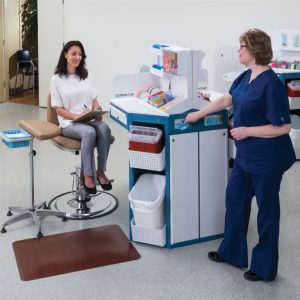Medical Assistant Career Guide: Responsibilities, Skills, and Opportunities to launch Your healthcare Path
Embarking on a career as a medical assistant can be a rewarding choice for those passionate about healthcare and patient support. With a diverse range of responsibilities, excellent job prospects, and opportunities for growth, becoming a medical assistant lays a solid foundation for a fulfilling healthcare career. This complete guide will walk you through the core responsibilities, essential skills, career opportunities, practical tips, and real-world insights to help you successfully start and thrive in your journey as a medical assistant.
Understanding the Role of a Medical Assistant
Medical assistants serve as a crucial link between patients and healthcare providers, supporting the daily operations of clinics, hospitals, and medical offices. They perform both clinical and administrative tasks to ensure smooth healthcare delivery.Here’s an overview of the primary responsibilities:
Key Responsibilities of a Medical Assistant
- Patient Intake and Communication: Greeting patients, scheduling appointments, verifying insurance, and updating medical histories.
- Vital Signs and clinical Procedures: Measuring blood pressure,taking medical histories,administering injections,and preparing patients for examinations.
- Assisting with Medical Examinations and Procedures: Handing instruments to physicians, prepping sterile fields, and assisting during minor surgeries.
- Administrative Tasks: Maintaining patient records, billing, coding, and managing correspondence.
- Medication and Supply Management: Restocking supplies, administering medications as directed, and ensuring a clean environment.
Essential Skills and Qualifications for Medical Assistants
To excel as a medical assistant, possessing a blend of technical skills and soft skills is essential. These abilities not only improve daily efficiency but also enhance patient care experiences.
Core Skills Needed
- Medical Knowledge: Understanding medical terminology,basic anatomy,and clinical procedures.
- Communication Skills: Clear communication with patients and healthcare team members, active listening.
- Organizational Skills: Managing schedules,patient files,and supplies effectively.
- Technical Skills: Proficiency with Electronic Health Records (EHR) systems, medical instruments, and administrative software.
- Compassion and Empathy: Providing patient-centered care and support.
- Attention to Detail: accurate documentation,medication administration,and procedure assistance.
Educational and Certification requirements
Most medical assistants complete a post-secondary certificate or diploma program,which typically lasts 9 months to 1 year. Certification,such as the Certified Medical Assistant (CMA) or Registered Medical Assistant (RMA),can enhance employability and earning potential. Many states require licensure or certification, so check local regulations.
Career Opportunities and Advancement
Starting your career as a medical assistant opens doors to various roles within healthcare, with potential pathways for advancement and specialization.
Typical Career Paths
| Position/Role | description |
|---|---|
| Medical Assistant | Entry-level clinical and administrative support staff in healthcare settings. |
| Certified medical Assistant | Typically involves additional certification that can lead to higher wages and responsibilities. |
| Medical Office Manager | Oversees staff, schedules, and administrative operations in medical offices. |
| Specialized Medical Assistant | Focuses on areas like phlebotomy, EKG, or medical billing. |
| Healthcare Administrator | Leads healthcare facilities, with pathways through further education and experience. |
growth and Demand
The U.S. Bureau of Labor Statistics projects a 15% growth rate for medical assistants from 2021 to 2031,faster than the average for all occupations. Growing access to healthcare services and an aging population boosts demand for skilled medical assistants.
Benefits of a Medical assistant Career
- High job stability and consistent demand
- Competitive salary with room for growth
- Opportunities to make a meaningful difference in patients’ lives
- flexible work settings, including clinics, hospitals, and specialties
Practical Tips to Launch Your Healthcare Path as a Medical Assistant
- Get Certified: Completing a reputable medical assistant program and obtaining certification increases employability.
- Gain Hands-On Experience: Internships and externships provide valuable clinical skills and industry connections.
- Develop Soft Skills: Cultivate empathy, patience, and professional communication.
- Stay Current with Industry trends: Regularly update your knowledge about healthcare regulations, EHR systems, and best practices.
- Network: Join professional organizations like the American Association of Medical Assistants (AAMA) for resources and networking opportunities.
Real-Life Case Study: From Student to Medical Assistant
Sophia, a recent graduate, took a 10-month certified medical assistant program. She gained practical experience through externships at a local clinic. with her certification, Sophia secured a position at a pediatric practice. Her proficiency in EHR systems and compassionate patient care led to quick promotions, and now she considers specializing in pediatric healthcare – illustrating how foundational skills can lead to diverse opportunities.
Conclusion
Choosing a career as a medical assistant can be the stepping stone to a fulfilling and stable healthcare career. With a mix of clinical duties, administrative tasks, and patient interaction, medical assistants play a vital role in healthcare teams. By acquiring the right education, certification, and skills, you position yourself for a promising future filled with growth opportunities, job stability, and meaningful work.Whether you’re just starting out or looking to advance,a career as a medical assistant offers a practical,rewarding way to make a difference in healthcare every day.



